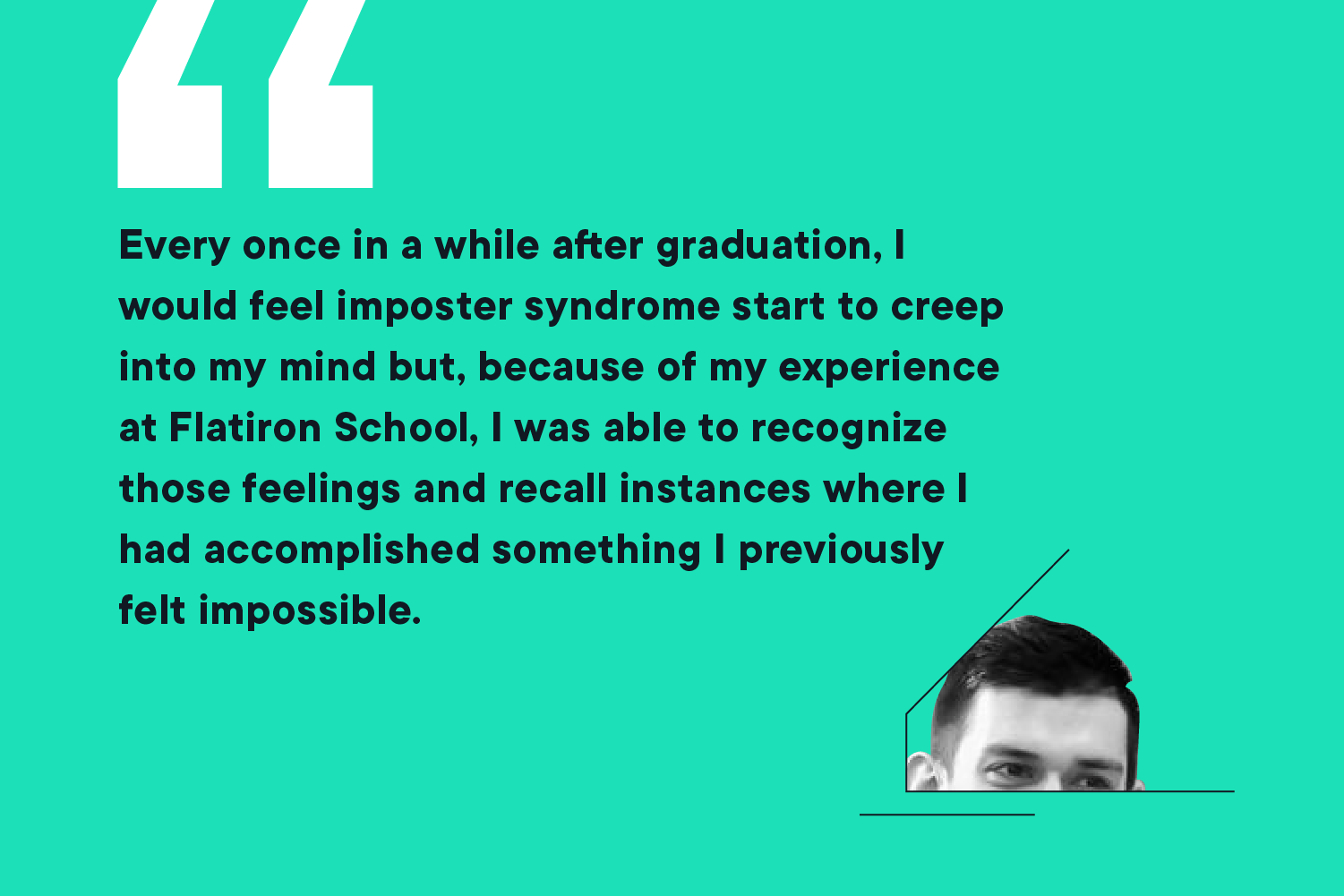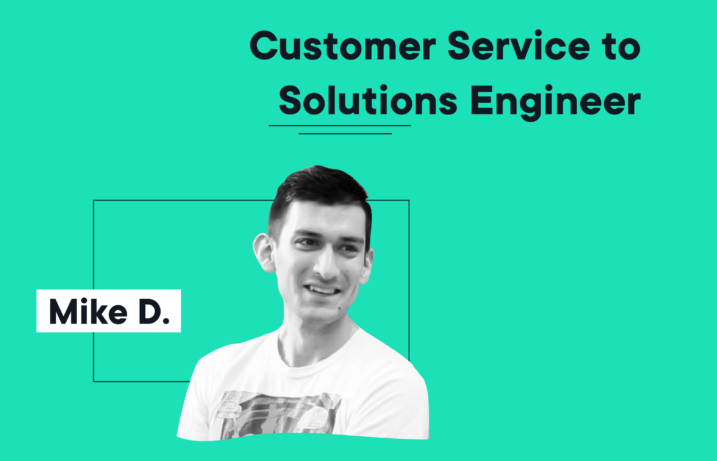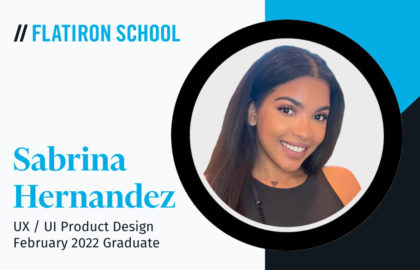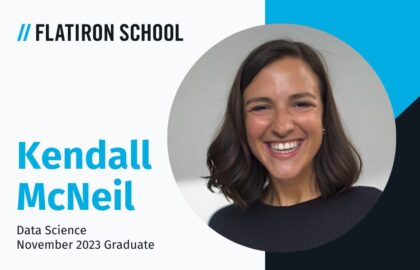Meet New York City Flatiron School alum and Solutions Engineer at Attentive, Mike Diaz!
Mike was the Head of Customer Service at a retail company Bonobos. He didn’t have an initial interest in tech but had a desire to build systems and understood that learning to code was an inevitability for all of us moving forward. After being laid off Mike applied to our Software Engineering program and began his learning journey in January 2020 and in March transitioned to remote instruction (when the pandemic hit). He graduated from the program in May and by July, Mike began working at Attentive. He currently has a better salary than he ever did working in customer service, even when he had 11 people reporting to him. Here, Mike tells his story:
What is your background and experience, and what led you to Flatiron School? What did you do before FIS?
I studied Electronic Media at the University of Miami with the intent of working in television or radio after graduation. I had no luck job hunting in that field as I was preparing to graduate, but I did find a promising opportunity in the Enterprise Rent-a-Car Management Training Program. I worked at Enterprise for about a year and a half, learning what it takes to run a business, work as part of a team, and provide exemplary customer service in a retail space.
In December of 2012, I was given the opportunity to work in radio with the newly established CBS Sports Radio Network. I was a Tape and Board Operator responsible for editing audio and being part of the production team in-studio. The work was very enjoyable because it was low-stress, but the world of radio is incredibly tough and demanding and opportunities are dwindling, so I saw these as signs that I needed to move on. I started working at Bonobos as a Customer Experience “Ninja” in 2016 and ended up Manager of Support and Service when I was laid off in October of 2019. I ran the customer service team along with a partner and managed 11 direct reports.
At Bonobos, the CX room is right next to the Engineering room, separated by a glass wall. We were frequently exposed to engineers and I was inspired by their power and autonomy. Of course they had schedules and responsibilities, but from our perspective, they had the power to make true repairs to customer experience issues where we could only provide a patch. They had more control over their lives and their schedules, earning more to give them financial freedom and having more opportunities to work remotely. This was likely the start of my curiosity into a career in software or web development.
What made you choose Flatiron School as a way to change your career, rather than going back to college, or teaching yourself?
I never considered going back to college, teaching myself, or anything else, because those options to me appear to be prohibitively expensive, time-consuming, and stressful, with no guarantee that they would put me in a better position to find a job.
I was able to meet my coach who told me the words I needed to hear: “you don’t have to be a genius…you don’t need prior experience…many of our graduates have a job with a good salary within 6 months” (see our full Jobs Report). Thanks to this information and the confidence I gained through access to the coding bootcamp prep workshop, which I was somewhat able to understand and follow, I could do the math and say that this was a very safe investment of my time and money.
What were some of your favorite projects that you built where you were in the program?
I’m very happy with my last two projects. The final project was a fantasy football auction draft simulator, which was the first thing I thought about building when I started learning about software engineering. It’s not as smart as I’d like it to be, but it represents having an idea and making that into a reality over several months of study and hard work.
My previous project was a collaboration with a classmate called Desert Driver. It’s a side-scrolling driving game that we built together as part of an assigned project. Besides being a great-looking, fun game (all credit for styling goes to my teammate), it represents a meaningful collaboration that I think helped me make a really great friend. I didn’t want to do the project because I felt it was too ambitious, but seeing my classmate's passion inspired me to try and make it great for the class and also continue to work on it after graduation. I’m proud to say that I worked with him and that we hosted a pretty polished product.

How did you land your current role?
The most valuable advice I got from Flatiron School was: networking. It was a required part of the career services track after graduation and I heard it at every guest speaker event that I attended. I had been skeptical about networking before, but I was primed to listen to that advice after unsuccessfully job-hunting after I had been laid off but before I attended the bootcamp.
Networking was fun and so valuable. I got the opportunity to catch up with people I hadn’t spoken with in years and hear their stories and get advice from them. Their advice in turn made me better at networking, programming, and job-hunting. Ultimately I got my job because of networking–someone at Attentive asked one of my connections if they knew anybody who might fit in on their team and my name came up. That never would have happened if I had not been working every day to develop relationships and inspire others to advocate for me.
Have you found your previous professional background useful in your new job?
I believe it was helpful in getting the job because in my interview, the hiring manager appeared to be impressed when I discussed my management experience and could talk to him about my perspectives on people management and team dynamics. It’s also been helpful because, in the world of customer service, you have to have some level of knowledge of every aspect of your business. I had used Jira to communicate with engineers before, for example. It was also helpful because Bonobos was an e-commerce company and many of Attentive’s clients are in e-commerce, so I’m familiar with terms like PDP, ATC, GDPR, and CCPA.
What would you say was the biggest challenge in your journey of learning to code?
The biggest challenge is learning to code! There are so many different tools and frameworks and each time you level up you learn that there are three new things that you have to connect to the thing you just barely understand how to use. I’ve been told that this is normal and that nobody feels confident, even veterans, but…I still have trouble believing them! I think it’s more critical to accept that you’re never going to feel like you know everything than it is to try and learn everything.
What advice do you have for other people thinking about making a career change and attending a bootcamp?
If you can do what I did, which is attend boot camp full time without working another job, I would highly recommend it. This luxury was a huge help in managing stress and putting effort into my studies, though I recognize that it’s not an option for everyone.
I would also say that there are so many bootcamps that there’s likely something perfect for every type of person. Flatiron School was great for me because I had no previous experience and was lacking confidence in my ability to execute a career change. This bootcamp stresses emotional wellness and I felt that it did a great job addressing the anxieties that come with studying something new.
Our instructors and guest speakers constantly brought up imposter syndrome which helped me tremendously in the job search and the workplace. Every once in a while after graduation, I would feel imposter syndrome start to creep into my mind but, because of my experience at Flatiron School, I was able to recognize those feelings and recall instances where I had accomplished something I previously felt impossible.




